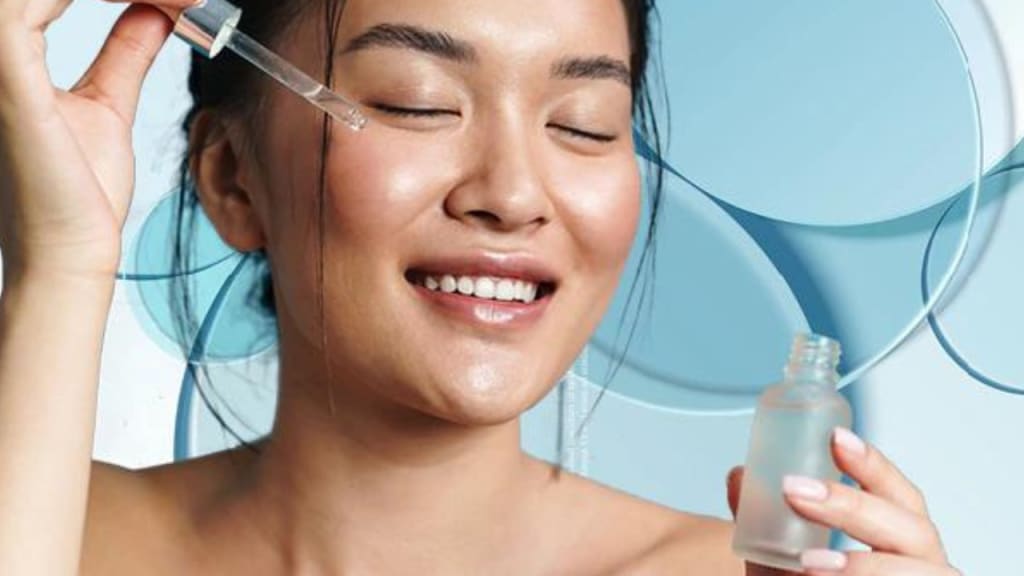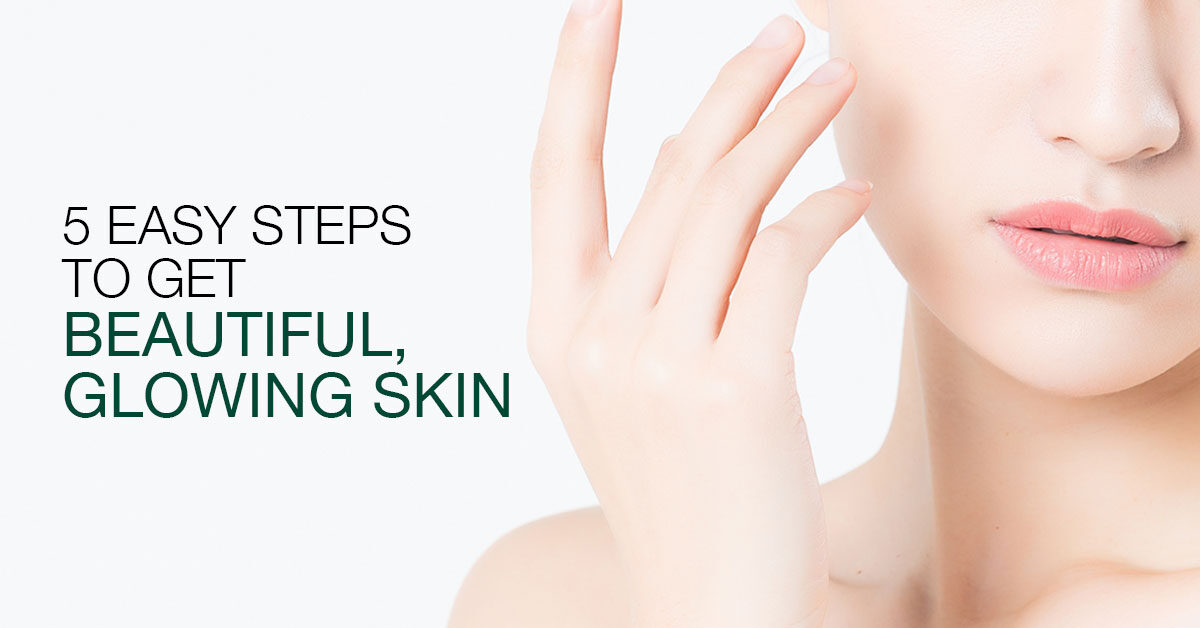When it comes to the quest for ideal skin, the definitions, expectations, and approaches vary widely among individuals. Each person has their own unique vision of what perfect skin should look and feel like. However, there's a universal desire that transcends these differences – the aspiration for glowing skin. While there are no fixed parameters for what constitutes "glowing skin," it is often characterized by a smooth and soft texture that appears healthy, well-hydrated, and well-cared-for through a combination of external skincare practices, dietary choices, and lifestyle habits.
In the era of ever-evolving beauty ideals and the constant influx of skincare trends, it's vital to emphasize sustainable and holistic approaches to skincare. This not only ensures the long-term health of your skin but also aligns with responsible environmental practices.
Defining Glowing Skin

In the world of beauty and skincare, trends and ideals constantly evolve. Gone are the days when a matte finish was the epitome of beauty in makeup and skincare. Today, the concept of "glass skin," with Korean glass skin being particularly desirable, has taken center stage. This trend emphasizes the use of oils and serums in skincare routines, resulting in a hydrated, radiant complexion. It's a trend that skincare enthusiasts find satisfying and therapeutic, and they're willing to embrace the appearance of a "glazed donut" at night to achieve that coveted glow.
Glowing skin is often described as having a luminous, radiant, and healthy appearance. It's the kind of skin that exudes vitality and appears well-hydrated, smooth, and youthful. When you have glowing skin, it's as if you have an inner light that shines through, enhancing your overall attractiveness. It's important to note that the concept of glowing skin is subjective and can vary from person to person, depending on their unique preferences and cultural influences.
The Characteristics of Glowing Skin

To better understand what glowing skin entails, let's delve into its key characteristics:
- Smooth Texture: Glowing skin is characterized by a smooth and even texture. It feels soft to the touch and lacks the roughness or unevenness often associated with skin issues like acne or dryness.
- Hydration: One of the fundamental aspects of glowing skin is proper hydration. Well-hydrated skin appears plump and supple. It retains moisture effectively, preventing dryness and flakiness.
- Radiance: Radiance is perhaps the most defining feature of glowing skin. It's the natural glow that comes from within, giving the skin a luminous and healthy appearance. This radiance is often attributed to factors like good blood circulation and the presence of certain skincare ingredients.
- Youthful Appearance: Glowing skin has a timeless quality to it. It tends to appear more youthful, as it lacks the signs of premature aging, such as fine lines, wrinkles, and sagging.
Quick Fixes vs. Long-Term Solutions
Achieving glowing skin is a journey that requires time and dedication for noticeable results to surface. In the interim, people often resort to quick fixes like highlighters and illuminating makeup bases to create the illusion of radiant skin. There's nothing inherently wrong with using makeup as a personal choice or as a form of self-expression that boosts confidence.
However, problems arise when this beauty trend intensifies, creating a fear of missing out (FOMO) among many individuals. As a result, some may feel justified in spending exorbitant amounts of money on expensive skin treatments such as dermabrasion, laser therapy, microdermabrasion, photorejuvenation, botox, fillers, and carbon dioxide laser procedures.
The Deceptive Allure of High-Cost Treatments

One prevalent misconception propagated by the beauty and skincare industry is that the more money one invests in treatments, the better the results will be. This deceptive belief has turned the skincare treatment industry into a multi-million dollar business. However, many of these treatments lack proven safety and sustainability, raising concerns about their long-term effects on skin health.
In the pursuit of glowing skin, it is essential to consider the safety and sustainability of the chosen course of action, whether it's a product or a procedure. Fortunately, there are alternatives available, such as scientifically developed skincare formulations that prioritize both efficacy and environmental responsibility.
The efficacy of a skincare product often depends on the formulation and the way ingredients are designed to function optimally. Biotechnology is one such approach to formulating skincare products, harnessing the power of science to create formulations that are not only effective but also sustainable. Peptides, a group of amino acids that serve as the building blocks of proteins like collagen and elastin, are one of the beloved ingredients in such formulations.
How to get glowing skin?

Achieving glowing skin requires a combination of proper skin care, healthy lifestyle choices, and consistency. Here are some essential tips to help you get that coveted radiant complexion:
- 1. Cleanse Regularly:
- Importance: Cleansing is the foundation of any skincare routine. It helps remove dirt, oil, makeup, and environmental pollutants that can clog pores and dull your skin's natural radiance.
- Choosing the Right Cleanser: Select a cleanser appropriate for your skin type. If you have oily or acne-prone skin, opt for a gel-based or foaming cleanser. For dry or sensitive skin, a hydrating or creamy cleanser is more suitable.
- Cleansing Technique: Use lukewarm water to wet your face, apply a small amount of cleanser, and gently massage it into your skin using upward, circular motions. Rinse thoroughly and pat your face dry with a clean towel. Avoid using hot water, as it can strip your skin of essential oils.
- Frequency: Cleanse your face twice daily—once in the morning to remove impurities that accumulate overnight and once before bedtime to wash away makeup, sweat, and pollutants from the day.
- 2. Exfoliate Weekly:
- Importance: Exfoliation is the process of removing dead skin cells from the surface of your skin. It reveals fresher, more radiant skin underneath and can help improve skin texture and tone.
- Exfoliating Products: Choose an exfoliant that suits your skin type. There are two main types: physical exfoliants (with small grains or particles) and chemical exfoliants (containing alpha-hydroxy acids or beta-hydroxy acids). Be cautious not to over-exfoliate, as this can irritate the skin.
- Exfoliation Frequency: Exfoliate 1-2 times a week, depending on your skin's needs. Sensitive skin may require less frequent exfoliation, while oilier skin can tolerate more frequent exfoliation.
- Post-Exfoliation Care: After exfoliating, follow up with a hydrating toner and moisturizer to replenish moisture and maintain the skin's natural barrier.
- 3. Moisturize Daily:
- Importance: Moisturizing is essential for all skin types. It helps lock in hydration, prevent moisture loss, and maintain a healthy skin barrier. Even if you have oily skin, using the right moisturizer can help balance oil production.
- Choosing the Right Moisturizer: Select a moisturizer suitable for your skin type. For oily skin, choose a lightweight, oil-free moisturizer. Dry skin benefits from richer, hydrating creams. Combination skin can use different moisturizers for different areas of the face.
- Application: Apply moisturizer to clean, damp skin. This helps trap moisture and creates a protective barrier. Use upward strokes and gently massage the product into your skin.
- Morning and Night: Moisturize both in the morning and before bedtime to keep your skin hydrated throughout the day and night.
- 4. Sun Protection:
- Importance: Protecting your skin from the sun's harmful UV rays is crucial for preventing premature aging, pigmentation issues, and skin cancer. Sunscreen is your best defense.
- Choosing Sunscreen: Select a broad-spectrum sunscreen with at least SPF 30. Broad-spectrum means it protects against both UVA and UVB rays. Look for a product that suits your skin type, such as a matte finish for oily skin or a moisturizing sunscreen for dry skin.
- Application: Apply sunscreen generously to all exposed skin areas, even on cloudy days. Reapply every two hours when outdoors or after swimming or sweating.
- Year-Round: Sunscreen is a year-round necessity, not just for sunny days. UV rays can penetrate clouds and windows, so protect your skin every day.
- 5. Healthy Diet and Hydration:
- Importance: What you put into your body reflects on your skin. A balanced diet and proper hydration are essential for nourishing your skin from within.
- Balanced Diet: Incorporate a variety of colorful fruits and vegetables into your diet. They provide antioxidants that combat free radicals, which can damage your skin and lead to premature aging.
- Omega-3 Fatty Acids: Include foods rich in omega-3 fatty acids, such as fatty fish (salmon, mackerel), flaxseeds, and walnuts. These fats help maintain your skin's elasticity and hydration.
- Vitamin C: Foods high in vitamin C, like citrus fruits, strawberries, and bell peppers, promote collagen production and contribute to a brighter complexion.
- Limit Sugar: Minimize your consumption of sugary and processed foods, as excessive sugar intake can lead to inflammation and skin issues.
- Hydration: Drink plenty of water throughout the day to keep your skin well-hydrated. Proper hydration helps maintain skin elasticity and a healthy complexion.
By following these detailed steps, you can establish a skincare routine that not only promotes glowing skin but also supports your skin's long-term health and vitality. Remember that consistency is key, and it may take some time to see significant improvements in your skin's radiance.
Awear Beauty’s Peptide Glow Serum: A Sustainable Solution

For those seeking a better understanding of how to achieve glowing skin, products like Awear Beauty’s Peptide Glow Serum exemplify the synergy of knowledge, formulation expertise, and environmental consciousness. This serum boasts a carefully curated blend of ingredients that work harmoniously to promote radiant skin:
- 40% Rice Water: Rich in probiotics and antioxidants, rice water reduces the appearance of fine lines and texture on the skin, revealing a softer glow.
- Hyaluronic Acid: With three different molecular weights, hyaluronic acid penetrates all layers of the skin, providing deep hydration and preventing transepidermal water loss.
- Bicowhite® Complex: This multi-target delivery system addresses five processes involved in the formation of dark spots, resulting in gentle and effective skin color unification. Clinical studies have shown that Bicowhite® reduces the Melanin index, brightening and unifying the skin tone.
- Ectoin® Natural: This 100% natural molecule offers excellent anti-aging and cell-protection benefits, contributing to overall skin health.
- Peptide Complex: Peptides stimulate collagen production and assist in repairing the skin from within, promoting smoother skin.
- Vitamin C: Known for its skin-brightening properties, vitamin C evens out the skin tone, fights free radicals, and enhances collagen production.
- Panax Ginseng Extract: Improving circulation, brightening the skin, and reducing fine lines and wrinkles are some of the benefits associated with Panax ginseng extract.
- Licorice Extract: Licorice extract helps brighten the skin and control inflammation, contributing to a clearer complexion.
- Centella Asiatica: This ingredient soothes and calms irritated skin, reducing inflammation, and improving the skin's barrier function.
These properties make Awear Beauty’s Peptide Glow Serum a desirable all-in-one solution for achieving glowing skin. However, it's important to note that any skincare product can only perform at its best when complemented by other factors like proper nutrition, a healthy lifestyle, and consistency. Patience remains a key attribute in the quest for radiant skin, as results often require time to manifest.
5 Factors Influencing Skin Health:
Achieving and maintaining glowing skin is not solely a matter of genetics or luck; it's also influenced by various external and internal factors. Let's explore some of these factors:
- Diet and Nutrition
The old adage "you are what you eat" holds true when it comes to skin health. A balanced diet rich in vitamins, minerals, antioxidants, and essential fatty acids can nourish your skin from within. Foods like fruits, vegetables, and omega-3 fatty acids contribute to a healthy complexion.
- Lifestyle Choices
Our lifestyle choices, including sleep patterns, stress management, and physical activity, can significantly impact our skin's health. Chronic stress, for instance, can lead to increased inflammation, which may manifest as skin issues like breakouts or redness.
- Skincare Practices
A consistent and appropriate skincare routine is essential for maintaining glowing skin. This includes cleansing, exfoliating, moisturizing, and protecting your skin from the sun's harmful UV rays. Choosing products tailored to your skin type and concerns is key to a successful skincare regimen.
- Environmental Factors
The environment we live in plays a crucial role in our skin's health. Exposure to pollution, UV radiation, and harsh weather conditions can damage the skin over time. Protecting your skin from these environmental stressors is essential for preserving its youthful appearance.
- Genetics and Skin Type
While we can't change our genetics, understanding our skin type is vital for effective skincare. Skin types, such as oily, dry, combination, or sensitive, have unique needs and may require specific products and treatments.
Conclusion
The pursuit of glowing skin is a personal journey, and the definition of ideal skin may vary from person to person. However, the universal desire for radiant, healthy skin unites us all. While trends like glass skin have reshaped the beauty landscape, it's essential to strike a balance between quick fixes and long-term solutions.
Investing in expensive treatments isn't always the key to achieving glowing skin; rather, a well-formulated, scientifically backed product like Awear Beauty’s Peptide Glow Serum can offer effective and sustainable results. To maximize the benefits of skincare products, maintaining a consistent routine, making healthy dietary choices, and embracing patience are crucial.
In the pursuit of radiant skin, let us not only prioritize personal beauty but also consider the beauty of our environment by choosing sustainable skincare solutions that benefit both ourselves and the planet. Ultimately, glowing skin is not just a surface-level goal; it reflects a holistic approach to self-care and well-being.



